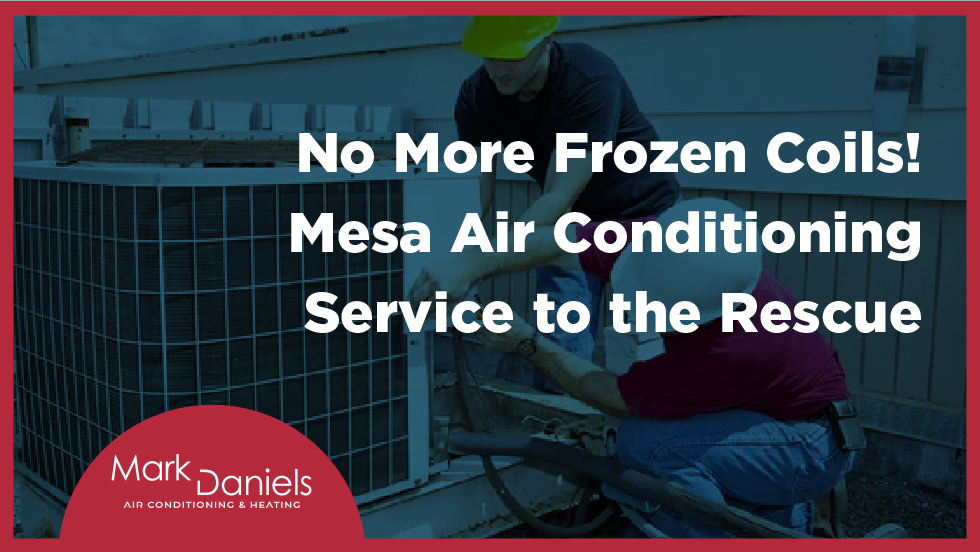Licensed | Bonded | Insured

No More Frozen Coils! Mesa Air Conditioning Service to the Rescue!
You’re doing a bit of maintenance on your AC when you notice something glinting atop the coils.
Bending over for a closer look, you realize the culprit is something you thought impossible: there’s ice on your AC in the middle of an Arizona heatwave! What gives?
Here at our Mesa air conditioning service, we get confused calls from customers about this phenomenon every year.
No matter how surreal the situation may seem, frozen coils can rear their ugly heads during any season.
What causes coils to freeze?
Should you be worried?
If you’re wondering what to do about this strange problem, read on for our best tips.
What Are the Warning Signs of Frozen Coils?
First things first: how can you tell when to check for this problem?
If your evaporator coils have frozen, you’ll likely notice other problems with your unit.
The temperature of your home may not be as comfortable as it used to be, with warm air blowing instead of cold in the worst-case scenario.
Your thermostat’s readings likely won’t match the temperature you feel inside your home.
You may also notice condensation, water, or even ice around your indoor AC unit.
However, this can happen with drain line clogs, so you may have to do some troubleshooting.
Where Is My Evaporator Coil?
To understand why your evaporator coils might freeze, you’ll need to know what they do and how they work.
An evaporator coil (sometimes called an “AC” or “cooling” coil) sits in your indoor air conditioning unit.
Depending on the system you own, it may be inside the blower cabinet or air handler, which is often tucked inside a utility closet or crawl space.
The primary job of your evaporator coil is to help cool your home.
It does this by removing heat from indoors and allowing the blower fan to deliver cooler air in its place.
To absorb heat, your evaporator coil uses refrigerant, which it sends further into your AC system.
Why Do I Have Frozen AC Coils?
Your evaporator coils can freeze for a variety of reasons, from inadequate maintenance to a system breakdown.
Let’s look at two possible reasons:
Airflow Issues
The most common culprit behind this problem is surprisingly simple: poor airflow!
If debris has clogged your AC filter, it can reduce airflow in your home.
This, in turn, can make it harder for your coils to keep transferring warm air outdoors, causing temperature fluctuations that freeze the coils.
Other common causes of poor airflow include closed or blocked return vents and damaged air ducts.
Problems with your blower fan may also reduce airflow.
If this component gets damaged, your AC may struggle to send warm air outdoors and bring cool air inside.
This can allow ice to build atop the coils.
Low Refrigerant
Because refrigerant is crucial to your air conditioning coils’ performance, a leak or low fluid levels can wreak havoc on your system.
Reduced refrigerant can cause condensation to form on the metal coils, and cool temperatures can turn this condensation into ice.
Are Frozen Evaporator Coils Hazardous?
Your air conditioner deals with cold air all the time.
What’s wrong with leaving a bit of ice on your evaporator coils?
Not so fast! This issue isn’t just a cosmetic one; it’s a threat to your entire system.
If you continue to run your air conditioner, you may put it at serious risk.
As we’ve discussed above, your evaporator coils are a crucial part of how your AC cools your home.
When they freeze over, it gets harder and harder for your system to transfer hot and cold air as needed.
This inefficiency can cause significant wear and tear and raise your utility bills.
Worse, your system may not be able to keep your home at a comfortable temperature!
To protect your system, we recommend turning your AC off right away.
How Do I Unfreeze AC Coils?
You may be able to unfreeze your evaporator coils on your own, especially if you’ve caught the problem early.
If you notice this issue, here’s what to do:
Let Your Coils Defrost
After turning your AC off, give your coils some time to defrost.
The timeline for this will depend on the buildup of ice. In some cases, you may need 12-24 hours.
Another tactic is to leave your AC powered on but use the fan-only setting, ensuring that it doesn’t try to deliver cool air.
This allows your system to push ambient-temperature air over the frozen coil, which may unfreeze it.
If you own one, a hairdryer can help speed things up.
Be sure to keep it on low heat, and don’t put its heating element in direct contact with the coils.
Check Your Air Filter
Check your air filter for debris and switch it out for an upgraded model if necessary.
Sometimes, swapping to a clean filter is all your system needs to improve airflow and get back to its routine functions.
Clean Your AC
After you’ve given the ice time to defrost, wipe up any water or condensation.
Removing the moisture can help keep the evaporator coils in good condition.
You can also turn on the fan setting to help with this.
Now is also a good opportunity to clean the area around your evaporator coils as well, especially if you’ve been neglecting regular AC maintenance for a while.
Remove any dust or debris to keep your system in peak condition.
Get Mesa Air Conditioning Service
If you’ve noticed frozen foils, reduced cooling power, or low airflow, the troubleshooting tips above may help solve your problem!
However, if you’re still struggling to get your AC back up and running afterward, getting help from a reputable Mesa air conditioning service may be your best bet.
That’s where Mark Daniels Air Conditioning & Heating comes in.
Offering quality AC repairs to Arizona families since 1996, our trained and licensed technicians will do the job with a 100% satisfaction guarantee.
If you’re worried about frozen coils, get peace of mind by requesting same-day HVAC repairs!
Looking for a dependable HVAC contractor in Mesa? Trust Mark Daniels Air Conditioning & Heating. Our team offers expert maintenance and expert service for all your HVAC needs across the Valley of the Sun. Call (480) 571-7219 or request service online now!



